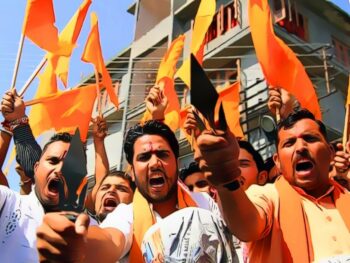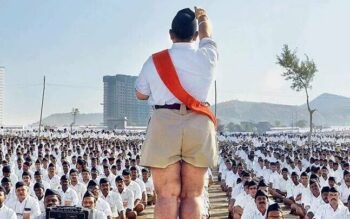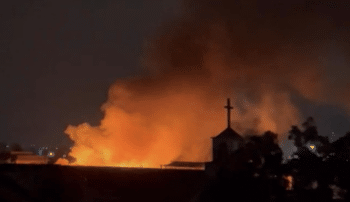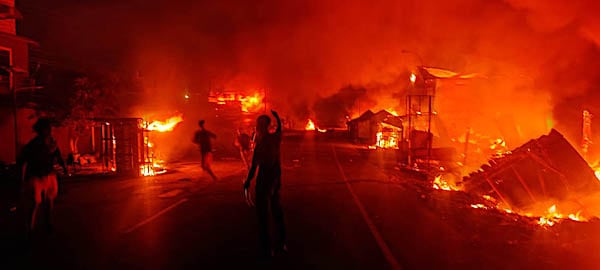Nazi imagination and practices of grotesque brutality are formative to Hindu nationalism. “Volksgemeinschaft” or national community was, for Nazis, the ideal society to be achieved through mass movement, statecraft, thieving, violence, race experiments, and Holocaust. The “Other” was its target.
M.S. Golwalkar, an early ideologue of the Rashtriya Swayamsevak Sangh (RSS), professed deep admiration for the Nazis. An inspiration to Prime Minister Narendra Modi, Golwalkar, noted: “To keep up the purity of the Race and its culture, Germany shocked the world by her purging the country of the Semitic Races—the Jews. Race pride at its highest has been manifested here.” Golwalkar continued that non-Hindus in India “may stay in the country, wholly subordinated to the Hindu nation, claiming nothing, deserving no privileges… not even citizen’s rights”.
Since their second electoral victory in 2019, the Modi and Bharatiya Janata Party-led national government has prioritised the actualisation of Akhand Bharat (“undivided India”), the mythologised once-future homeland of Hindu nationalists. Across India, experiments to forge the “Hindu national community” are predicated on the breakage of minoritised Muslims and Christians, and Adivasis and Dalits. Across the historically fraught political construct termed the “northeast”, the Hindutva movement attacks Muslim citizenship while igniting the decimation of indigeneity and the Christian community. In Kashmir, it furthers coloniality through land occupation to potentially reconstitute demographics.

Hindutva groups. Representative image. (Photo: PTI)
Since 2022, racist discourse and monstrous violence by Hindu nationalists have spun out of control. Swarms of Hindu militias are storming village after town, supported by Hindu nationalist leaders and central and state governments, the silence of upper class-caste Hindus, and the complicity of various courts, institutions, and state forces. In 2023, the savagery reached a crescendo. UAPA. Mobs. Bombs. Bulldozers… Haryana. Uttar Pradesh. Delhi. Rajasthan. Jharkhand. Assam. Kashmir. Manipur…
Capture East
In the northeast, the Modi government repositioned the 1991 Look East Policy to commence the Act East Policy for military and trade ascendancy, and also to motivate securitisation. In contrast to security measures to safeguard freedom and well-being, securitisation weaponises social life, religion, and government. The promissory of trade and commerce accompany the fabrication of dangers posed by non-Hindus, racialised as internal antagonists. Émigrés across historically porous borders are concocted as external enemies. The capture of tribal lands and labour at the borderlands shatters indigenous identity, culture, and self-determination.
On March 27, the Manipur high court required the state government to endorse the inclusion of the dominant Hindu Meitei community under the Scheduled Tribe designation. Such inclusion adversely impacts marginalised tribes, such as the Kuki-Zo indigenous/tribe, a majority of whom converted to Christianity to escape caste/tribe oppression. Meiteis comprise over 53% of Manipur’s population, and 83% of the Meiteis are Hindus. Meitei ethnic identity emerged through the joining together of various tribal groups. Initially opposed to their incorporation into the brahminical order, the Meiteis were progressively neutralised through their Hinduisation and castefication.
Proponents of Hindutva disparage the customary and constitutional rights of Christians and Muslims, Adivasis and Dalits, and those that convert from Hinduism in India. Marginalised communities have been steadily denied access to “reservations” (akin to affirmative action), including at educational institutions. The selection, notification, and identification of Scheduled Castes and Scheduled Tribes, and the criminalization of tribes, are mediated by Hindu majoritarian power politics.
Made public on April 19, the Manipur high court’s directive induced large-scale dissent. The protests of the Kuki community encountered brutal reprisal as Hindu-descent Meitei and Hindu nationalist militias executed a pogrom. Between May 3 and July 2023, more than 286 attacks were committed on Kuki-prevalent areas across Manipur. Acts of terror deployed with excessive power and impunity, wherein approximately 170 members of the Kuki community died, over 48,500 persons were displaced, and 2,440 homes were torched or damaged.
Between May 4 and June 3, 255 churches were burnt down, destroyed, or looted. Meitei women were mobilised to block roads to aid the mobs. The events took place with the complicity of state officials and the partisan involvement of state forces personnel. Meitei Muslims (also Pangals)—the fourth largest community in Manipur following Hindu Meiteis, Nagas, and Kukis—were threatened for aiding the Kuki.
Mass sexual violence against two Kuki women by a Hindu Meitei mob did not receive wide condemnation until mid-July when a video depicting the public assault went viral online. The Meitei mob of reportedly 900-1,000 persons targeted a Kuki village with murder and plunder. They reportedly paraded two Kuki women naked, gangraping one of them. More women were raped. The violations and scrutiny have been unbearable for the community.
Hate speech, falsified statements, and deception surrounded the atrocities. Meitei political leaders claimed, “May 3 was just the small spark.” The Organiser (RSS mouthpiece) noted that the Coordinating Committee on Manipur Integrity urged that Kuki “militants” be proclaimed “terrorists for waging war against civilians and security forces”, and that the World Meitei Council contended that the violence was planned by the “Myanmar migrant Kuki-Chin”. Manipur chief minister Biren Singh accused Kuki “militants” of “narcoterrorism.”
Cycles of aggression ensued. Arms and ammunition were looted from state forces, largely by Meiteis. Certain Kuki groups and individuals responded with force. Violence by members of the Kuki community in early May displaced approximately 5,000 Meitei. In mid-June, Kuki persons reportedly killed none Meitei men who were part of a mob that had torched Kuki homes and in early July, three Meitei persons were killed.
Favoured by Union home minister and strident Hindu nationalist, Amit Shah, the Manipur chief minister continues in office, lauded for his immoderate stance against the Kuki and his support of dominant Meitei interests. The Modi government did not act to stop the hostilities, incurring a no-confidence motion in parliament. The bloodshed further divided Meitei, Naga, and Kuki, and Christians, Muslims, and Hindus. The Kuki People’s Alliance revoked their support to the BJP in the state legislative assembly.
Hinduisation
The plan to proliferate a mass movement to Hinduise the Northeast was operationalised decades ago. The Hindu Right organisations were instituted to train foot soldiers, future leaders, and militia operatives. Around 1949, RSS centers appeared in Assam, then Manipur. By 1965, the RSS started day-to-day operations in the region. By 1975, several Hindu Right branches were functional across Manipur, and at the turn of the 21st century, a BJP member was tasked with overseeing developments there.

RSS drill. (Photo: Twitter)
Leading up to and following the demolition of the Babri Masjid in 1992, the Sangh Parivar group of Hindu nationalist organisations escalated activities in Manipur. Misleading that aggressive and non-consensual Christian conversions were rampant in the northeast, the RSS and Vishwa Hindu Parishad (VHP) set up Banabasi [Vanvasi] Kalyan Ashram and Adimjati Samity to force out Christians or “bring home”/ forcibly convert them to Hinduism.
In 1993, the fabrication of Muslim influx into Manipur culminated in the mass targeting of the Muslim Meitei community. By 1994, Hindu nationalist programming concentrated on forced assimilation through “national integration,” campaigning against “illegal immigration”. By 1995, there were reportedly 650 branches of Hindu Right organisations in the northeast. By 2017, there were over 6,000 such entities. In 1998, four Catholic nuns were raped in Madhya Pradesh, following which Hindu nationalists propagandised about Christian violence against Hindus. A Vishwa Hindu Parishad (VHP) leader reportedly stated without proof that in Nagaland and Manipur,
Christians [were] committing atrocities on Hindus.
During the 2000 decade, organised violence in Manipur perpetrated by state forces against civilians incorporated torture, including rape and summary executions, and found support among the Hindu Right. Impunity laws, such as the Armed Forces (Assam and Manipur) Special Powers Act, 1958 (amended, including in 1972) and other legislations, extended de facto immunity to state forces. Between 2008-2014, reportedly 340 Ekal Vidyalaya schools were operationalised by Hindu nationalists across Assam, Manipur, and Tripura, with 12,000 students. In 2014, RSS leader Mohan Bhagwat inaugurated a conference of cadres in Imphal.
The BJP gained two Manipur assembly seats in 2015. That August, state legislation on land revenue and reforms, commerce, and “protection of people” marginalised Manipur’s vulnerable tribes. Following the Modi-led government’s electoral victory in 2014, the BJP took power in Manipur in 2017, aided by the growth of Hindu nationalism in the region. For this triumph, Hindu nationalists praised the Northeast Democratic Alliance (NEDA) and the Manipur BJP.
Early in 2017, led by the BJP, Hindutva organisations ramped up activities among the Meiteis to secure the “Hindu Vote”. Segments of the Meitei community were untrusting of the BJP’s political alliance with sections of the Naga community. As Hindu nationalists enlarged their grassroots presence, they identified flashpoints for the Hinduisation of the Meitei and promoted Vaishnavism as a method in saffronisation.
On August 13, 2019, the RSS appropriated Patriot’s Day, inserting a depiction of “Bharat Mata” (Mother India) between portraits of Manipur luminaries. Hindu nationalist schools started materialising across Manipur, operated by Akhil Bharatiya Vidyarthi Parishad, Bal Sanskar Kendra, Bharatiya Jan Seva Sansthan, Bharat Kalyan Pratishthan, Ekal Vidyalaya, Friends of Tribal Society or Van Bandhu Parishad, Kisan Sangha, Rashtriya Shaikshik Mahasangh, Sewa Bharati, Sewashram, Vanavasi Kalyan Ashram, Vidya Bharati, and VHP.
In May 2019, Amit Shah spoke of “external aggression,” positioning the National Register of Citizens (NRC) as a mechanism for expelling “infiltrators”. Akin to Nuremberg Race Laws instituted in 1935 in Nazi Germany, India’s prejudicial citizenship laws legalise Hindu ascendance, creating “racialised” hierarchies of belonging.
In 2022, an RSS leader stated in Manipur that the organisation’s principal obligation was the “protection of Bharat, preservation of its identity, and consolidation of [a] Hindu world”. An event, ‘Lok, Beyond Folk: Reimagining Bharat’s Future’, emphasised “national self-hood”. That year, the BJP was re-elected to state power in Manipur.
The government required state approval for books on the culture, history, geography, and tradition of Manipur and pushed for implementing the NRC. Presently applicable in Assam, NRC’s Islamophobic experiment to reconstitute Indian citizenship through legal discrimination impacts millions of Bangla-origin Muslims, who also self-identify as Miya Muslims. Next is the implementation of the NRC in Manipur to evaluate documentation of descent for millions of individuals, crossing generations, to decree if non-Hindus of Manipur may be bona fide citizens of India.
Today, Hindu nationalist organisations are allied with Hindu Meitei groups across Manipur, reinforced by VHP and Bajrang Dal units, aided by reportedly 107-120 RSS branches, 44 Akhil Bharatiya Kalyan Ashram units, and 463 Ekal Vidyalaya schools.
Disintegrating lifeworlds

Fire and smoke are seen against a church in Manipur. (Photo: Twitter/@MangteC)
Leading up to May 2023, majoritarian speech racialised the Kuki community as “Other”/“Outsider”. In January this year, Amit Shah stated that “in just eight years, PM Modi has visited Manipur 51 times”, claiming “we had promised to make Manipur free from terrorism, today Manipur is completely free from terrorism”. In April, the Manipur high court ordered the demolition of three churches citing “illegal” construction. Since May, Hindu nationalists and majoritarian Meitei Hindus collaborated to cement ethnic supremacy in the region.
A Kuki Christian community leader says,
It has taken concerted Hinduising to turn the Meitei people of the valley against us, Kuki, from the hills. Hindu nationalists (HN) treat the Hao (original peoples), Kuki, and Naga as untouchable. Tribal and Adivasi people were never Hindu. Hindutva’s ambition to convert us by allurement or by force and Meitei design for large-scale land grab are behind the violence. This process has been building for 30 years and has been exceptionally aggressive since 2019.
Reportedly, “instigated by the RSS, the Manipur government prompted the forest department to measure forest lands around early 2023”, manipulating laws to claim tribal lands. Community members conclude,
Manipur is inherent to the master plan, and connected to Gujarat (2002) and Kandhamal (Odisha 2007-8).
The 2023 attacks were premeditated. “The Meiteis see their alliance with the RSS as opportunistic, but the RSS will subsume the Meitei, using them to create warlike conditions.” Members of the Kuki Christian community say that hatred tore through the soul of their community. Physically violated, bodies are besieged with extreme fear. Material possessions, places of worship, memories, sacred sites, and livelihood, have been devastated. Indescribable violence, calculated to displace the Kuki from their homeland, leave them bereft.
The attacks sought to defile and destroy us, who we are, our life ethics, indigenous wisdom—Khankho, and ways of living. This estrangement, spiritual unbelonging, is torture.
Aiding our comprehension with hindsight, The Wire uncovered that the attacks began five days before Union home ministry was to sign a peace treaty with Kuki groups on May 8, granting an “autonomous territory council” under the Sixth Schedule of India’s Constitution.
On August 3, a mass burial laying to rest approximately 35 Kuki Christian bodies was halted and postponed by the state, in a dispute over land, intensifying social trauma. Violence, rejection, and erasure disintegrate the lifeworld of the Kuki-Zo, already enmeshed in complex histories, “like a hammer to the heart, breaking, breaking, breaking it apart”, mourns a community member.
Directives to decimate the Kuki circulate. Unlike “communal violence”—a term that masks radical dissimilarities in relations of power/state between Hindus and non-Hindu communities—the targeting by Hindu nationalists in Manipur-2023, Kuki leaders dread, is calculated to massacre their community through forcible assimilation, ethnic cleansing, presumptive statelessness, and calls to genocide.
The battle for the Hindu nation is sustained by psychic and physical brutality. Will further carnage before the next national elections, expected in May 2024, lead to the Hindu Right’s annexation of “India”? Resistance is profuse among marginalised communities in Manipur, as elsewhere, with solidarity from diverse allies. Yet, across India, dominant Hindus fail to collectively refuse ill-gotten privileges accrued through the deep-rooted, intersecting, and pernicious fault lines of caste, gender, and religion. This remains the pivotal impetus precipitating absolute nationalism.
Angana P. Chatterji is a co-chair of the Political Conflict, Gender, and People’s Rights Initiative, Centre for Race and Gender, University of California, Berkeley. Her recent publications include BREAKING WORLDS: Religion, Law, and Nationalism in Majoritarian India; The Story of Assam; and Majoritarian State: How Hindu Nationalism is Changing India.

